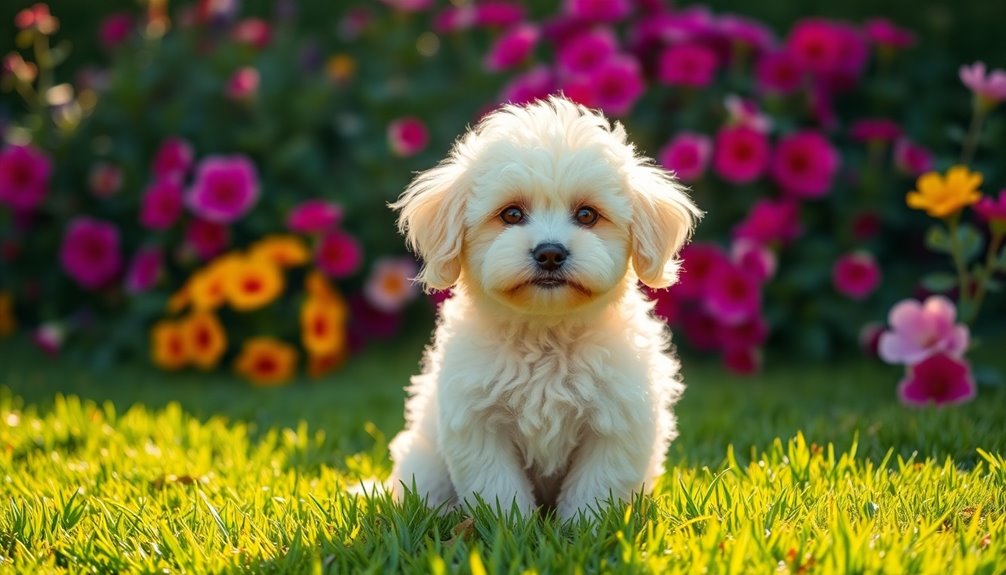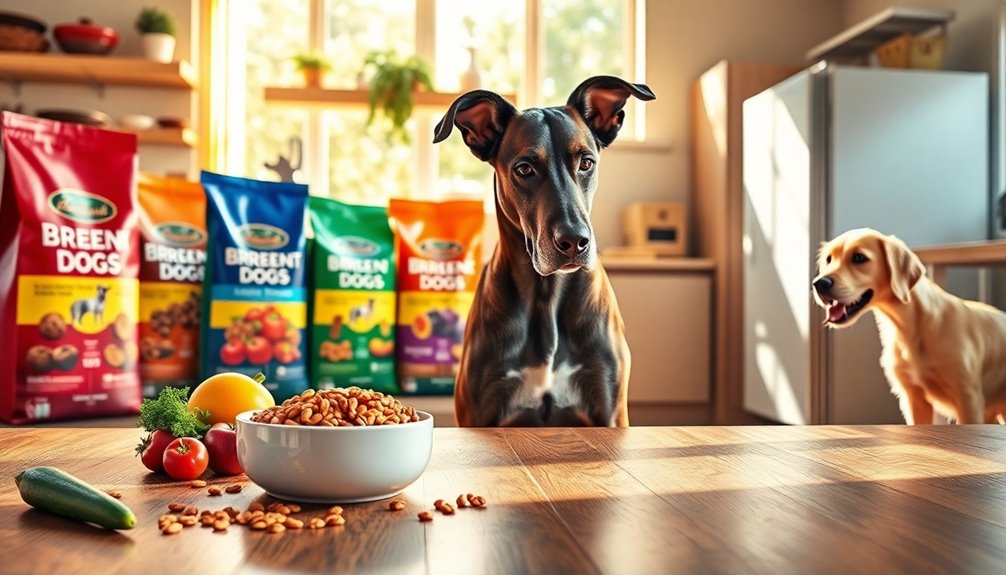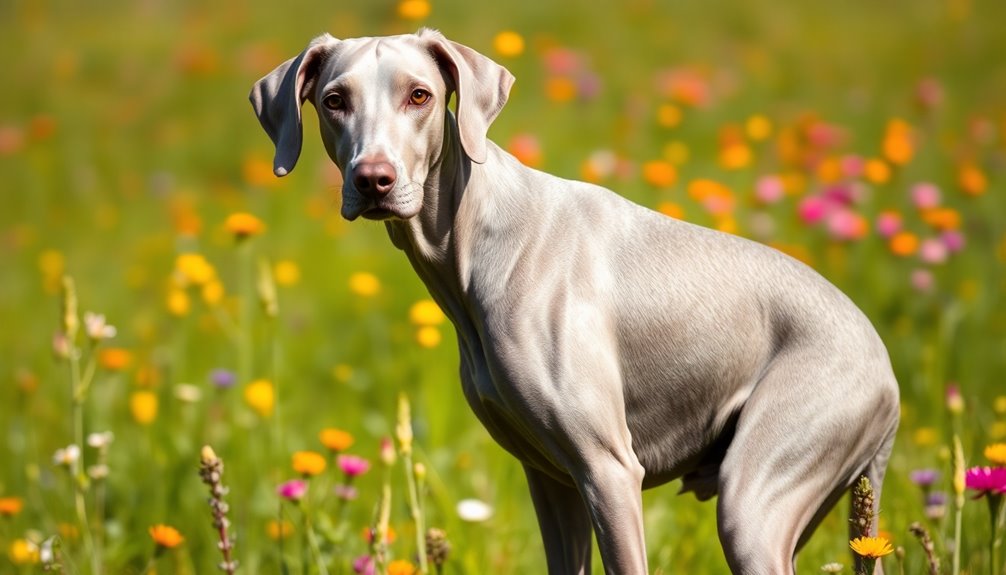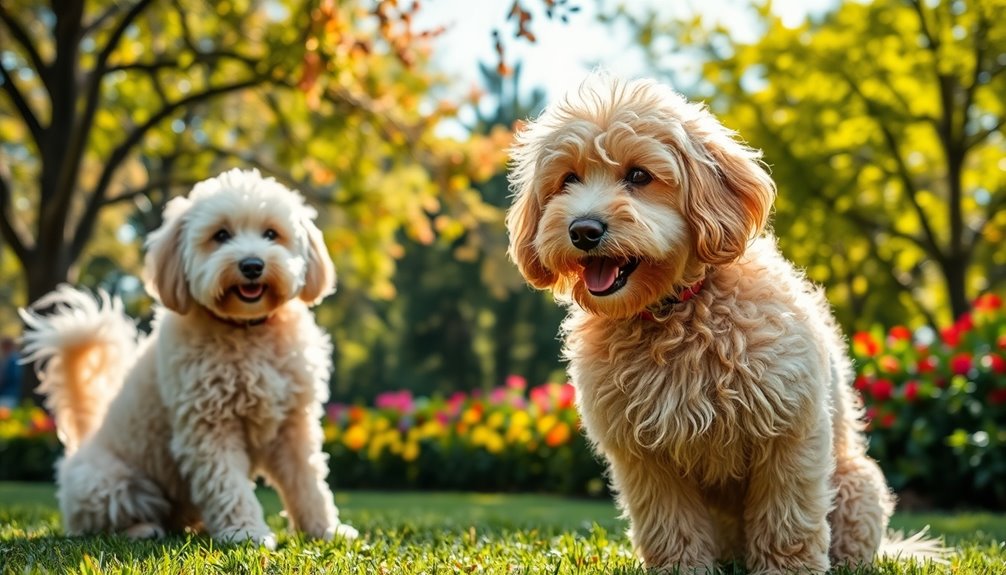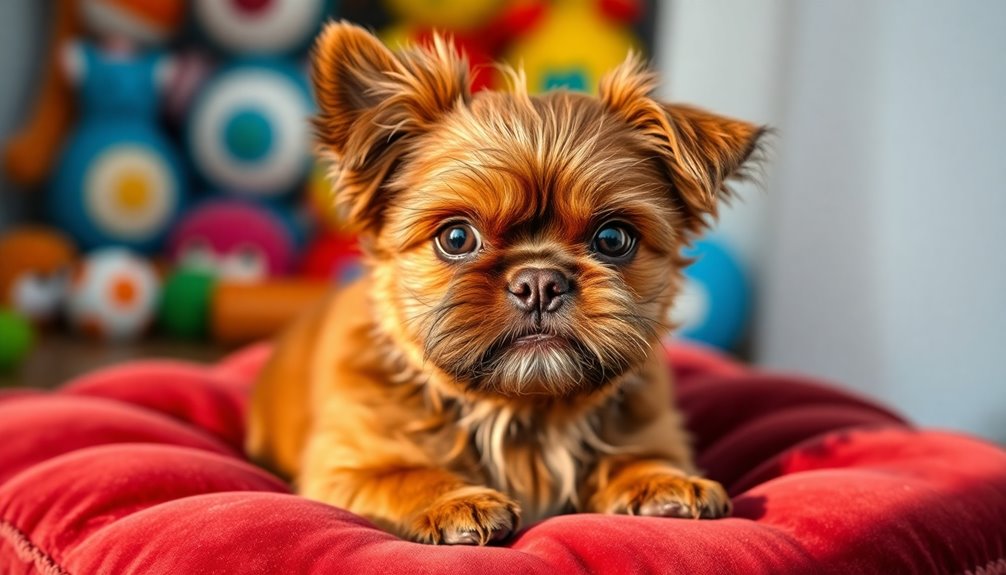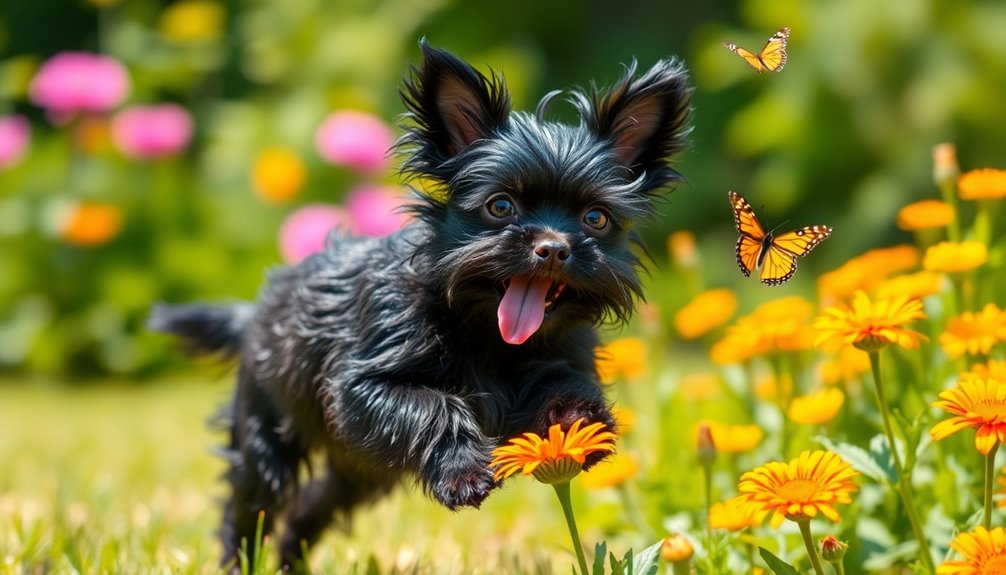If you're looking for a charming companion with a sharp mind, the Bichon Poo is the perfect choice for you. This delightful mix of Bichon Frise and Poodle stands between 9 to 15 inches and weighs around 10 to 18 pounds. Known for their playful and affectionate nature, Bichon Poos thrive on companionship and social interactions. Their hypoallergenic coat requires regular grooming but sheds little, making them suitable for allergy sufferers. With a lifespan of up to 15 years or more, they can be a long-term friend. Stick around to discover more about their care, training needs, and unique characteristics.
Key Takeaways
- The Bichon Poo combines the sociability of the Bichon Frise and the intelligence of the Poodle, making it an affectionate companion.
- With a lifespan of 12 to 15 years, proper care ensures longevity and a healthy life for your Bichon Poo.
- Their hypoallergenic, low-shedding coat requires regular grooming to maintain its health and prevent matting while being suitable for allergy sufferers.
- Bichon Poos thrive on socialization and positive reinforcement training, making them adaptable and responsive to commands.
- Daily exercise of 30 minutes to 1 hour keeps them happy and prevents anxiety-related behaviors, enhancing their charming personality.
Introduction
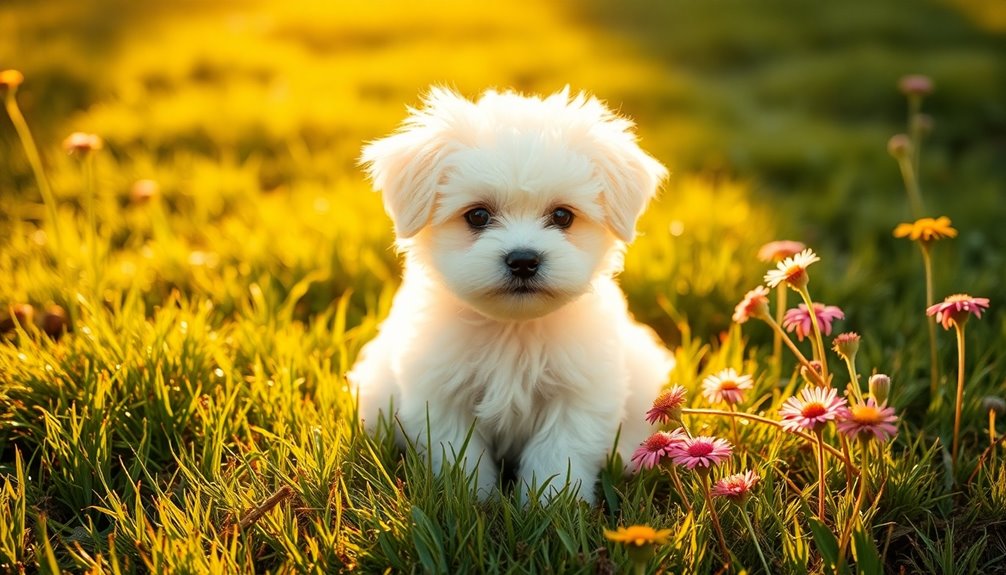
When you're looking for a dog that perfectly blends charm and intelligence, the Bichon Poo might just be the ideal choice. This delightful hybrid, a mix of the Bichon Frise and Poodle, stands between 9 to 15 inches tall and weighs anywhere from 6 to 20 pounds.
Their curly, continuously growing coats come in a range of solid colors, including white, black, and apricot, and they're known for being minimal shedders, making them a great hypoallergenic option. Low shedding is a significant trait that makes them suitable for allergy sufferers. Additionally, their coats require regular grooming to maintain proper grooming practices that help prevent matting and tangles.
Bichon Poos are friendly and affectionate, thriving on human companionship. Their lively and playful nature means they turn any moment into a fun-filled experience.
You'll find them easy to train due to their intelligence, but they do need regular mental stimulation to keep them engaged. Socialization comes naturally to them, as they often warm up quickly to new faces.
Keep in mind that these dogs can struggle with loneliness, so they thrive in environments where they're not left alone for long periods.
With proper grooming and care, including regular visits to the groomer, you'll enjoy the delightful company of a Bichon Poo for 10 to 18 years.
History and Origin

The Bichon Poo has a fascinating history rooted in the noble lineage of its parent breeds. Originating from the Bichon Frisé, which dates back to the 13th century and was favored by European royalty, this hybrid carries a legacy of charm and companionship. You'll find that the blend of these breeds not only reflects their regal past but also their evolution into beloved family pets. Additionally, their moderately active nature makes them well-suited for families looking for a playful yet manageable companion.
Where and when the breed originated
Originating in Australia, the Bichon Poo emerged in the late 20th century as a result of crossbreeding the Bichon Frise and Poodle. This designer breed first appeared in the 1990s, created by breeders who aimed to combine the best traits of both parent breeds.
The Bichon Frise contributed its friendly and sociable personality, while the Poodle added intelligence and remarkable trainability. Bichpoos are known for their charm and intelligence, which makes them ideal companions for families.
Breeders sought to address potential health issues found in purebred dogs through this crossbreeding. By mixing these two breeds, they aimed to reduce the risk of genetic disorders and produce a dog that wasn't only smart but also adaptable to various living situations.
The goal was to create an active, family-friendly companion that could thrive in diverse environments.
The Bichon Poo quickly gained popularity due to its charming appearance and friendly nature, and it has since spread globally.
As a modern designer breed, it reflects a trend towards creating dogs that blend aesthetic appeal with desirable behavioral characteristics.
Today, you'll find the Bichon Poo as a beloved companion in many households, showcasing the successful fusion of its parent breeds.
Companion for Nobility and Royalty
Throughout history, Bichon Frises have been treasured companions for nobility and royalty across Europe. These small, cheerful dogs captured the hearts of monarchs, particularly in France and Spain, thanks to their charming personalities and beautiful curly coats. Notable figures like King Francis I and King Henry III of France adored them, with Henry III famously carrying his Bichons in a basket attached to ribbons.
Their presence in royal courts symbolized wealth and refinement, making them essential lap dogs for aristocrats. Bichon Frises were often depicted in portraits by renowned artists like Titian and Sir Joshua Reynolds, highlighting their importance as royal companions. Queen Victoria and King Louis XIV also admired these delightful dogs, further solidifying their status among the elite. The breed's popularity was further enhanced by their introduction to France in the 16th century.
Lavishly pampered, Bichon Frises were dressed in luxurious fabrics, reinforcing their image as elegant pets. They frequently served as gifts among the aristocracy, ensuring their place in high society.
Their depiction in art and literature over the centuries helped maintain their popularity and charm, making them a lasting symbol of nobility and companionship.
Physical Characteristics

When you look at a Bichon Poo, you'll notice their small to medium size, typically standing between 9 to 15 inches tall and weighing anywhere from 6 to 18 pounds. Their curly, hypoallergenic coat not only adds to their charm but also requires regular grooming to keep it looking its best. You'll appreciate the range of colors and patterns that make each Bichon Poo unique, from solid whites to beautiful apricot mixes. These dogs usually have a lifespan of 12 to 15 years, making them a long-term companion for your family.
Size, weight, and coat details
The Bichon Poo boasts a delightful mix of size and build, making it an appealing choice for many dog lovers. Typically, this breed stands between 9 to 15 inches tall, with an average height at the shoulder ranging from 9 to 14 inches. The size largely depends on whether your Bichon Poo has a Toy, Miniature, or Standard Poodle parent. Weighing anywhere from 6 to 20 pounds, most Bichon Poos fall within the 10 to 18-pound range. In terms of physical build, you'll notice a compact body that features a sturdy, slightly rectangular shape, reflecting the traits inherited from both the Bichon Frise and Poodle. This small to medium-sized breed is well-suited for apartment and family living alike. Regular monitoring of their growth and weight is essential to ensure proper care and health.
Curly, Hypoallergenic Coat Texture
Bichon Poos flaunt a curly, hypoallergenic coat that's not just charming but also practical for allergy sufferers. This soft and dense coat can be curly, wavy, or fluffy, showcasing traits from both the Bichon Frise and Poodle parents. With low shedding, you'll notice minimal dander, making this breed a great choice for those with allergies. To keep this beautiful coat in top shape, regular grooming is essential. You should brush your Bichon Poo daily to prevent tangles and mats, particularly around sensitive areas like the eyes, armpits, and belly. A slicker brush and metal comb are your best friends in this effort. Additionally, schedule professional grooming every 4-6 weeks to maintain the coat's length and shape. Bathing your furry friend once a month will also help maintain their skin and coat health. You'll want to keep an eye out for any signs of allergies, like redness or dry patches. Regular grooming is particularly important due to their hypoallergenic coat, which can help minimize potential allergy triggers. With consistent care and attention, your Bichon Poo's curly, hypoallergenic coat won't only look great but also contribute to their overall well-being.
Temperament and Personality

When you bring a Bichon Poo into your home, you'll quickly notice their playful and sociable demeanor. They're perfect companions for families, individuals, or even other pets, thriving on interaction and love. Their lively spirit and friendly nature make them a joy to be around, ensuring everyone feels welcome. Additionally, their intelligent nature allows them to learn quickly and adapt to various household situations.
Playful and Sociable Demeanor
Joyful energy defines the Bichon Poo's playful and sociable demeanor, making them delightful companions. These lively little dogs are always ready for a game of fetch or chase, and their infectious playfulness encourages you to join in on the fun.
With a wealth of energy, Bichon Poos thrive on regular activity, whether that means running around in the yard or curling up on the couch for some cuddle time. Their high-energy nature requires mental and physical stimulation to keep them content.
Their sociable behavior shines through as they form strong bonds with you, their human. They're social butterflies, welcoming new faces with warmth and enthusiasm, and they often get along well with other pets when properly socialized.
You might notice them following you from room to room, always eager to stay close.
Bichon Poos possess high emotional intelligence, making them sensitive to your feelings. Their strong attachment to you means they can feel distressed when left alone for too long.
To keep them happy, ensure plenty of human interaction and engage their minds through positive reinforcement training.
With their playful nature and sociable spirit, Bichon Poos truly enrich your life with joy and companionship.
Suitability for families, individuals, or other pets
With their affectionate nature and playful spirit, Bichon Poos make excellent companions for families, individuals, and other pets alike. They're especially great for families with older children, as their energetic disposition encourages active playtime. However, supervision and proper training are essential to ensure safe interactions. Understanding their unique temperament is important for fostering positive relationships with children and ensuring harmonious household dynamics.
Bichon Poos adapt well to various living situations, including apartments, as long as they aren't left alone for extended periods. For individuals, these dogs thrive on companionship and require consistent human interaction. They need about 30 minutes of exercise daily to keep them mentally and physically healthy, and early socialization is vital due to their intelligence and occasional stubbornness. Their high-energy nature means they require at least 45 minutes of playtime each day to stay happy and healthy.
When it comes to other pets, Bichon Poos are generally social and integrate well into multi-pet households, provided they've been properly socialized from a young age. Their friendly disposition promotes harmonious relationships with other animals, and they typically exhibit gentle behaviors without aggression.
Just remember, grooming is necessary to maintain their coat, and addressing any potential potty training challenges is essential. By ensuring their emotional and physical needs are met, you'll enjoy a loyal, loving companion.
Health and Lifespan
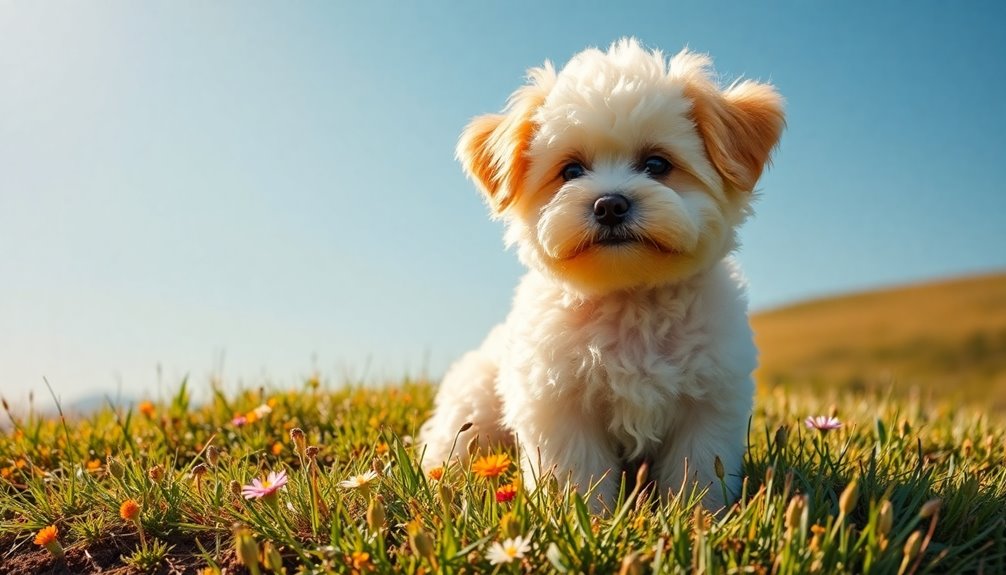
When it comes to the health and lifespan of your Bichon Poo, you can expect them to live between 12 to 15 years, with some even reaching up to 18 years. However, they can face common health issues like patellar luxation and allergies, so it's essential to stay proactive with their care. Regular health testing of their parent breeds can significantly contribute to their overall health and vitality.
Typical lifespan of the breed
The typical lifespan of a Bichon Poo ranges from 12 to 15 years, though some can live up to 18 years with proper care. This lifespan is similar to that of its parent breeds, the Poodle and the Bichon Frise. Smaller dog breeds tend to enjoy longer lifespans, and the Bichon Poo benefits from hybrid vigor, which can contribute to its longevity.
Several factors influence your Bichon Poo's lifespan. Health testing of parent dogs before breeding can reduce genetic health issues, while regular veterinary care ensures early detection of potential problems. A balanced diet and proper nutrition play a vital role in maintaining overall health. Additionally, the Bichon Poo is considered hypoallergenic due to its parent breeds, which can lead to a healthier living environment for both the dog and its owners.
Engaging your Bichon Poo in moderate exercise not only keeps them fit but also enhances their quality of life. Keep in mind that grooming is essential, as their high-maintenance coat requires regular brushing and trimming. Additionally, annual dental care is recommended to prevent dental issues that could affect their health.
Common health concerns or genetic predispositions
Health is a crucial aspect of a Bichon Poo's well-being, as both parent breeds can pass down genetic predispositions to various conditions.
From the Poodle side, you might encounter issues like Addison's disease, Cushing's disease, and patellar luxation. Additionally, be aware of Legg-Calve-Perthes disease and von Willebrand's disease, which can also affect your pup. Research has shown that mixed-breeds are not necessarily healthier than purebreds, so this is an important factor to consider.
On the Bichon Frise side, watch out for allergies and skin atopy, which are common. Dental disease and liver shunts (portosystemic shunts) can also arise, along with mitral valve disease and urolithiasis (kidney and bladder stones).
Your Bichon Poo may face shared health concerns, such as bladder infections and cataracts. Hip dysplasia and idiopathic epilepsy are also risks you should consider.
Don't overlook specific conditions like congenital hypotrichosis and corneal dystrophy. Hemophilia and patent ductus arteriosus (PDA) are additional disorders that could arise.
Tips for maintaining health and wellness
Focusing on your Bichon Poo's health and wellness is essential for ensuring a long, happy life. Start with grooming: brush their coat 2-3 times a week to prevent matting, and schedule professional grooming every 4-6 weeks.
Bathe them every few weeks with hypoallergenic shampoo, and keep an eye on their nails and ears to prevent discomfort and infections.
Dental care is crucial, too. Brush their teeth daily to fend off periodontal disease, and consider annual professional cleanings, as poor dental hygiene can lead to serious health issues.
A balanced diet tailored to their age and activity level is key; consult your vet for the best options. Avoid overfeeding and ensure they get quality food to support their overall health. Quality of breeder significantly impacts the overall health and lifespan of your Bichon Poo.
Regular exercise is vital for your Bichon Poo. Aim for daily walks and playtime, and provide mental stimulation to keep them engaged.
Early socialization helps them interact well with people and other pets. By focusing on grooming, dental care, nutrition, and exercise, you'll help your Bichon Poo live a long, vibrant life, typically 12-15 years.
Care Requirements

Caring for your Bichon Poo involves a regular brushing schedule to keep their coat healthy and prevent matting. Regular baths promote coat growth and maintain healthy skin, which is essential for their grooming routine. You'll also need to ensure they get enough exercise to match their energy levels, which helps keep them physically fit and mentally sharp. Regular exercise can also help prevent obesity, which is important as a balanced diet alone may not suffice. Lastly, providing a balanced diet tailored to their age and activity will support their overall well-being.
Regular Brushing Schedule Required
Maintaining your Bichon Poo's stunning coat requires a regular brushing schedule to keep it looking its best. Daily brushing is recommended to prevent matting and tangling, especially since their curly hair is prone to knots. If daily brushing isn't feasible, aim for 2-3 times a week, increasing frequency as their hair grows back. Regular brushing helps remove trapped hair, dirt, and debris, ensuring a clean and healthy coat. Additionally, regular grooming is essential every 4-6 weeks for maintaining coat health.
For effective brushing, use a metal comb and a soft slicker brush. You might also find a pin brush helpful for maintenance. Before you start, lightly mist their coat with a hydrating spray to avoid dryness.
You can easily handle regular brushing sessions at home in between professional grooming appointments, which should occur every 4-6 weeks.
During professional grooming, a full-service groom typically includes a bath, haircut, and nail trimming. Certified Master Groomers or those trained specifically for Bichon breeds are ideal.
Don't forget to check their ears for infections, trim their nails regularly, and prioritize dental care by brushing their teeth daily. A monthly bath, or more as needed, will keep your Bichon Poo looking and feeling fabulous.
Exercise requirements and energy levels
Regular grooming keeps your Bichon Poo looking sharp, but to ensure their overall well-being, you'll also need to pay attention to their exercise requirements and energy levels.
Your Bichon Poo needs about 30 minutes to an hour of exercise each day. Engaging them in walks, play at the dog park, or running around in your backyard will keep them active. Indoor games like fetch or tug can also work wonders, especially on rainy days.
These pups have moderate to high energy levels, so regular activity is essential to prevent anxiety, destructive behavior, and obesity. If you notice your dog seems bored, consider increasing their exercise. They enjoy playful activities, both indoors and outdoors, so mix it up to keep them stimulated.
You can adapt their exercise routine to apartment living, as long as you provide daily outings. Involving family members, especially kids, in playtime can enhance bonding while keeping your Bichon Poo engaged.
Consistency is key; regular exercise not only helps maintain their physical health but also supports their mental well-being, ensuring a happy and balanced life. Additionally, pet therapy has been shown to reduce anxiety in various patients, which can also apply to your Bichon Poo when they are stimulated and active.
Feeding tips and diet recommendations
To keep your Bichon Poo healthy and vibrant, feeding them a balanced diet is essential. Focus on high-quality protein sources to support muscle and bone growth. Carbohydrates provide energy, while fats help with hormone production and vitamin transport. It's important to ensure that the diet meets the protein requirement of at least 22% for optimal growth in puppies.
Don't forget the importance of vitamins and minerals for overall health, especially calcium and phosphorus for growing puppies.
Choose commercial dry dog foods that meet AAFCO guidelines and are formulated by a veterinary nutritionist. Avoid options with corn or soy as primary ingredients; instead, look for meat-based proteins. Canned dog foods can also deliver a higher percentage of meat protein.
If you prefer homemade food, ensure it's balanced and consult your vet for necessary supplements.
Puppies should transition from four meals a day at two months to two meals by six months. Adults generally need two meals daily, with portions based on weight and activity level.
Keep daily caloric needs in mind—ranging from 296 to 663 calories depending on activity. Treats should make up no more than 10% of their daily intake. Always provide fresh water, and consider supplements for joint health and coat condition.
Training and Socialization
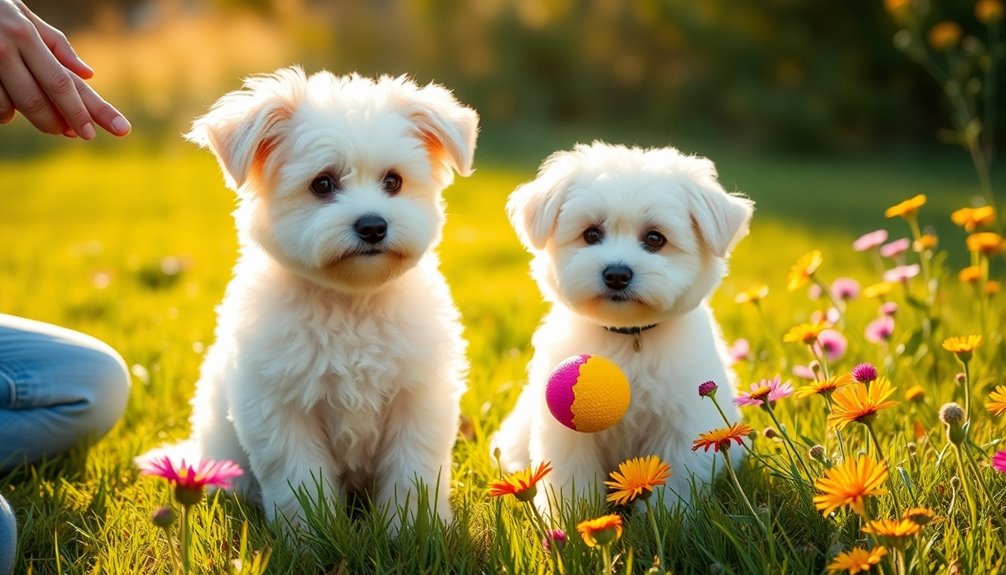
Training your Bichon Poo can be a rewarding experience, especially since they're moderately responsive to commands. However, you might face some housebreaking difficulties with puppies, so it's crucial to start early and be consistent. Monitoring behavior for cues can greatly assist in recognizing when your puppy needs to go outside. Gradual introductions to new friends will help them become well-adjusted and social dogs.
Moderately Responsive to Commands
Bichon-Poos are moderately responsive to commands, striking a balance between their eagerness to please and occasional stubbornness. Their intelligence makes them bright learners, and you'll find that they quickly grasp new commands and tricks when trained properly.
To make the most of their training, keep sessions short, fun, and filled with encouragement. Positive reinforcement is key—reward good behavior quickly with praise, treats, or playtime to reinforce the desired actions.
Consistency is vital, so establish a routine and stick to it. This helps your Bichon-Poo associate their actions with positive outcomes. Avoid using harsh tones, as this can lower their self-esteem and make training more challenging. Remember to be patient; while they're smart, they can still exhibit a bit of stubbornness at times.
If you encounter difficulties, especially with potty training, stick to a designated area and a consistent routine. Tools like potty bells can help them communicate their needs effectively. Given their high intelligence, engaging in dog sports like agility can also enhance their learning experience.
With a good approach and the right techniques, you'll nurture a well-trained and responsive Bichon-Poo that's a joy to be around.
Gradual Introductions to New Friends
Creating a welcoming environment for your Bichon Poo during socialization is essential for their development and confidence. Start by introducing them to family members first. This familiarizes your puppy with positive interactions before meeting strangers.
Ensure every encounter is rewarding—use treats, praise, and toys to make these introductions enjoyable. It's important to expose your Bichon Poo to people of various ages, ethnicities, and sizes, so they grow accustomed to different appearances and behaviors. Early exposure to various environments aids in developing confidence, which is vital for their overall growth.
When it comes to other pets, gradually introduce your Bichon Poo to well-behaved, vaccinated animals. Always supervise these interactions to maintain safety and positivity.
Early socialization is crucial for harmony among pets, so take your time and monitor your puppy's behavior closely.
Finally, don't forget to expose your Bichon Poo to new environments gradually. Visits to parks, quiet streets, or friends' homes can provide valuable experiences.
Ensure these outings are positive, avoiding overwhelming situations. By taking a slow and steady approach, you'll help your Bichon Poo develop into a confident, well-adjusted companion.
Housebreaking Difficulties in Puppies
Housebreaking a puppy can be a challenging endeavor, especially for those new to dog ownership. To set your Bichon Poo up for success, start with proper crate training. Choose a crate that's just the right size—big enough for your puppy to stand, turn, and lie down comfortably, but small enough to discourage bathroom use inside.
Introduce the crate with treats and toys, and gradually increase crating time as your puppy becomes comfortable. Scheduled outings are crucial. Take your puppy outside after sleeping, eating, or playing, as these activities trigger the need to relieve themselves. Keep a close eye on your puppy to catch any signs they need to go. Immediate feedback is vital; witnessing accidents helps you teach appropriate behavior.
Use positive reinforcement when your puppy goes outside. Praise them and consider implementing a potty bell system for communication. Consistent potty breaks will help reinforce a regular potty schedule, making it easier for your Bichon Poo to learn when and where to go.
Remember, Bichon Poos have small bladders, so frequent breaks are essential. Keep training sessions short, fun, and encouraging, using gentle tones to maintain their self-esteem.
Ideal Living Environment
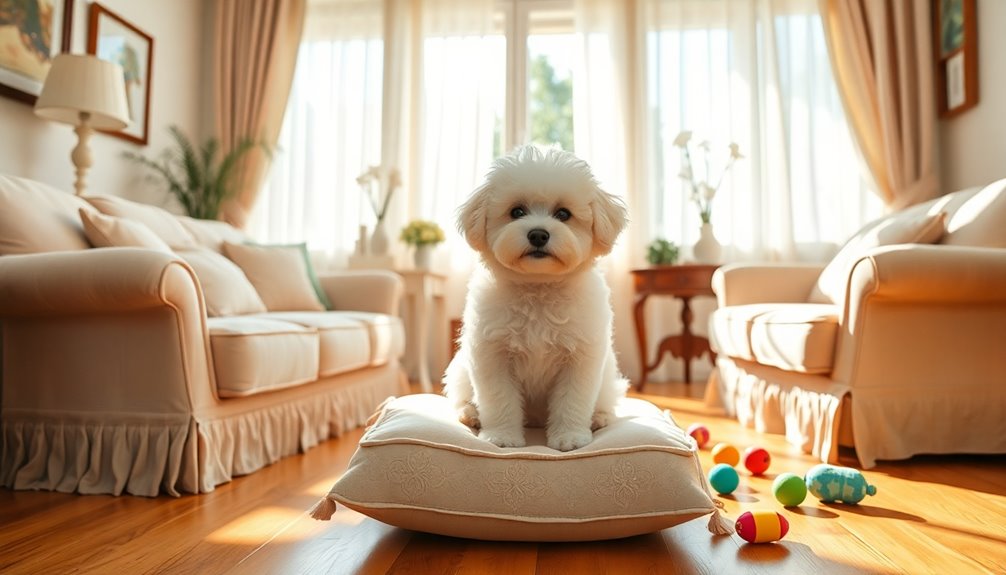
If you're considering a Bichon Poo, you'll find they adapt well to both urban apartments and suburban homes. Their small size makes them perfect for limited spaces, as long as you provide regular walks and playtime. Plus, they handle moderate humidity, so your living environment won't be a dealbreaker. Additionally, their high exercise needs mean that daily physical activity is essential for their overall health and well-being.
Urban Apartment or Suburban Home
When considering the ideal living environment for a Bichon Poo, both urban apartments and suburban homes can cater to their needs, provided you understand their unique requirements.
In an urban setting, their small size makes them perfect for compact spaces. You don't need a sprawling backyard; a cozy couch will do just fine. Daily walks and playtime are essential to keep them happy, requiring about 30 minutes of exercise each day. Frequent regular walks are crucial for their health and well-being. Additionally, engaging in humorous texting can be a fun way to stay connected with family and friends while out on walks.
On the other hand, suburban homes offer the advantage of a backyard for extra playtime. This space allows for activities like fetch and tug, supplementing your daily walks.
Regardless of where you live, maintaining a consistent grooming routine is crucial due to their high grooming needs.
Bichon Poos are friendly and sociable, thriving on human companionship. They're excellent family pets, especially with young children. However, ensure they don't suffer from separation anxiety by being left alone for too long.
Early socialization is key to their adaptability, whether you choose an urban apartment or a suburban home. Ultimately, both environments can be great, as long as you provide the love and attention they need.
Moderate Tolerance for Humidity
Bichon Poos generally thrive in moderate humidity levels, making them well-suited for climates that aren't too extreme. While these charming pups can adapt to various environments, they tend to struggle in extremely hot or cold conditions.
In humid weather, their undercoat naturally molts, helping them regulate their body temperature. However, excessive heat and humidity can lead to discomfort, so it's crucial to provide a cool, shaded area for them to relax. Regular grooming, which includes thorough rinsing, is essential, as it prevents matting in their curly coat and helps maintain skin health.
When living in a warm climate, keep an eye on your Bichon Poo for signs of overheating, such as excessive panting or lethargy. Regular grooming is essential, as it prevents matting in their curly coat and helps maintain skin health.
If you're in a region with high pollen counts, be mindful of potential allergies, which can cause discomfort and require veterinary attention.
Ultimately, creating a comfortable living environment for your Bichon Poo means finding a balance. Aim for moderate temperatures and humidity levels, combined with proper care and attention, to ensure your furry friend remains happy and healthy.
Vocal With a Charming Bark
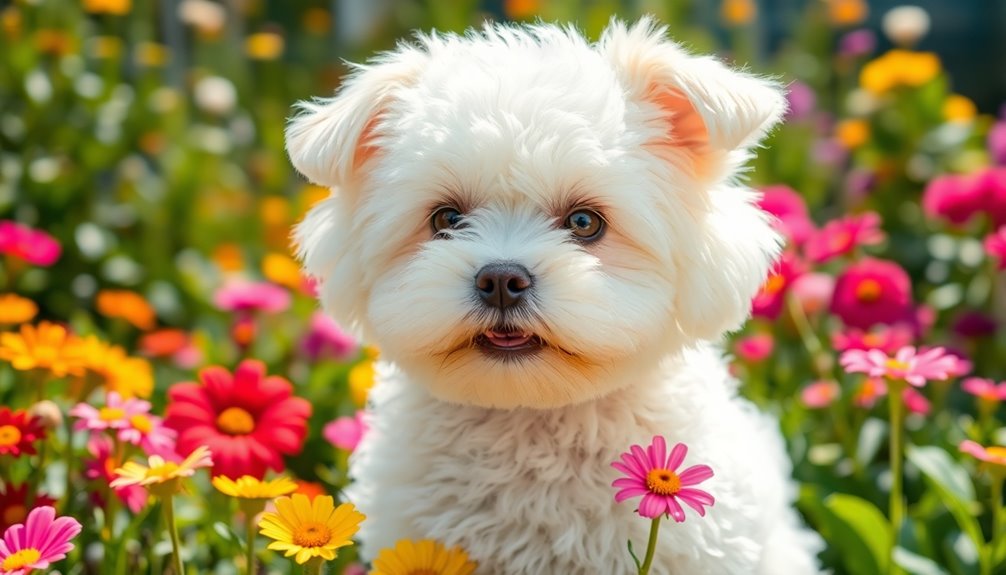
Bichon-Poos have a charming way of expressing themselves, making them quite vocal companions. While they rarely shed, making them ideal for allergy sufferers, their engaging barks can add a lively atmosphere to your home. Plus, if you're a fan of "The Secret Life of Pets," you might recognize their delightful personalities that shine through their vocalizations. Early socialization is crucial in ensuring that their vocalizations are friendly and not excessive, creating a harmonious environment.
Rarely Sheds, Ideal for Allergies
If you're looking for a dog that rarely sheds and is ideal for allergy sufferers, the Bichon Poo fits the bill perfectly. Thanks to its genetic background from both the Bichon Frise and Poodle, this breed has minimal hair loss, making it a great option for sensitive owners.
The Bichon Poo has a hair-based coat that reduces shedding and dander, which is often the primary trigger for allergies. While it's not completely hypoallergenic, its low allergenic potential means fewer allergens are released into your home. However, you'll need to keep up with regular grooming to prevent mats in their curly coat. It's important to monitor your Bichon Poo for any signs of allergies or skin issues, like redness or bald patches, and consult your vet if you suspect any problems. Additionally, seasonal shedding can still occur, so being aware of your pet's changing coat throughout the year is essential.
Famous in "The Secret Life of Pets
Have you ever wondered which charming breeds could steal the spotlight in animated films? While Bichon Poos don't make a direct appearance in "The Secret Life of Pets," their delightful presence in dog-related media is undeniable.
With their cute, friendly demeanor and intelligence, they often shine in dog photography and social media, captivating audiences across platforms. Their hypoallergenic coat makes them a popular choice for families who suffer from allergies, allowing more people to enjoy their lovely companionship. Regular outings for puppy socialization help them adapt to new environments and interact well with others.
Though they mightn't bark loudly, Bichon Poos are vocal communicators, using a variety of sounds to express their feelings. Their expressive nature makes them seem like they're having a conversation, adding to their charm.
These dogs are attentive and responsive to their owners, making them excellent companions for families and individuals alike.
Bichon Poos are friendly, adaptable, and great with children, thriving on interaction in various living environments. Their high intelligence means they're easy to train and excel in obedience, quickly learning commands and behaviors.
While they mightn't have a starring role in animated films, their personality traits would surely make them a favorite among viewers if they did. You can imagine how they'd steal the show with their charming bark and loving nature!
Ideal for Allergy Sufferers?
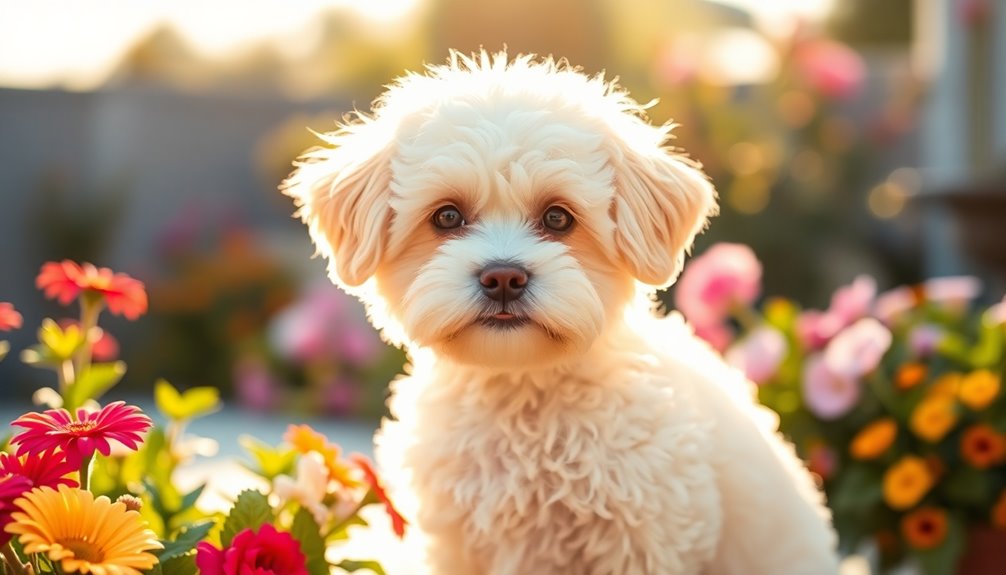
If you're considering a Bichon Poo and have allergies, you'll likely appreciate their hypoallergenic traits.
Their minimal shedding means less dander in your home, but you'll still need to commit to regular grooming to keep allergens at bay. Additionally, it's important to be aware that common allergens for Bichon Frises can still provoke reactions, so monitoring their environment is key. Regular grooming can also help reduce the risk of dental health issues that may arise from neglecting canine hygiene.
With proper care, these charming pups can be a great fit for allergy sufferers and first-time owners alike.
Great for First-Time Owners
For first-time dog owners, the Bichon Poo offers an ideal blend of charm and manageability, making it a fantastic choice. Their small size, rarely exceeding 20 pounds, allows them to thrive in compact living spaces like apartments or townhomes. You won't need a large yard; a small area will suffice as long as you provide adequate attention and exercise.
Bichon Poos are friendly and charismatic, making them great family pets. They get along well with children and enjoy participating in family activities. Their affectionate nature means they love cuddling and being close to you, forming strong bonds that can be quite fulfilling. Additionally, regular grooming can aid in managing allergens, making them suitable for those with allergy sensitivities. Such grooming practices can also enhance their cognitive development by creating a positive and engaging environment for interaction.
Training them is a breeze thanks to their intelligence inherited from their poodle lineage. With positive reinforcement, they respond well and learn quickly. While they've high energy, they only need about an hour of exercise daily, making it manageable for new owners.
Grooming Needs and Frequency
Grooming the Bichon Poo is a vital aspect of keeping this charming breed healthy and comfortable, especially for those who suffer from allergies. You'll want to brush your Bichon Poo 2-3 times a week to prevent matting and tangling in their long, continuously growing hair. Depending on their lifestyle, a bath every 1-3 weeks is ideal, using high-quality, hypoallergenic shampoos to minimize skin irritation and allergen buildup. Regular grooming helps minimize dander dispersion, making this breed even more suitable for allergy sufferers. Additionally, regular grooming can help detect issues such as chin mites early on, ensuring prompt treatment if necessary. Professional grooming every 4-6 weeks is also recommended to maintain their coat and keep it looking its best.
Don't forget nail care—trimming their nails every 3-4 weeks helps maintain their overall hygiene. Use a metal comb and soft slicker brush to effectively manage their curly coat, and lightly mist it with a hydrating spray before brushing to avoid dryness. Daily tooth brushing is essential to prevent dental issues, while regular ear checks can help avoid infections. Since Bichon Poos are minimal shedders, daily brushing not only helps manage their coat but also reduces loose hair and dander, making them a great choice for allergy sufferers.
Frequently Asked Questions
How Much Exercise Does a Bichon Poo Need Daily?
A Bichon Poo needs about 30 minutes of exercise daily.
You can take them for walks, engage in playtime, or even do some agility training at home.
It's important to mix things up to keep it interesting for them.
Just be mindful not to over-exercise, especially if they're a young puppy.
If it's raining, don't worry—indoor activities can still provide great stimulation and keep your pup happy and healthy!
Are Bichon Poos Good With Children and Other Pets?
Yes, bichon poos are great with children and other pets! Their friendly and playful nature makes them perfect companions for kids, while their calm demeanor helps them get along with other animals.
Just supervise interactions to ensure respect, especially with younger children. They adapt well to various environments, making them easy to integrate into households with multiple pets.
With proper socialization, they'll thrive and create joyful bonds with everyone in your family!
What Is the Average Cost of a Bichon Poo?
The average cost of a Bichon Poo varies widely based on factors like breeding and location.
If you're looking to buy from a breeder, expect to pay between $1,000 and $3,000. Adoption fees are much lower, ranging from $100 to $400.
Don't forget to factor in initial setup costs, which can be $50 to $250, plus ongoing monthly expenses for food, healthcare, and grooming that can total $115 to $370.
How Often Should I Groom a Bichon Poo?
You should groom your Bichon Poo several times a week, ideally 2-3 times, to keep its coat healthy and free from matting.
Daily brushing is even better, using a slicker or pin brush to remove tangles.
Regular baths every 1-3 weeks are essential, but avoid over-bathing.
Don't forget to take your pup to a professional groomer every 6-8 weeks for a trim to maintain that adorable fluffy look!
Do Bichon Poos Tend to Bark a Lot?
Yes, Bichon Poos can bark a lot, but it varies by individual. You might notice they bark when they're frightened, bored, or seeking your attention.
They often express themselves vocally during playtime, too. If you don't properly train and socialize them, their barking may increase.
To manage this, you can teach them commands like "quiet," provide plenty of stimulation, and ensure they're well-socialized to reduce excessive barking.
Conclusion
In conclusion, the Bichon Poo combines charm and intelligence, making it a delightful companion for any household. With their playful nature and adaptability, they fit well in various living environments. Their low-shedding coat is a huge plus for allergy sufferers, too. By providing proper training and socialization, you'll unlock their full potential as a loving pet. If you're looking for a furry friend that's both affectionate and smart, the Bichon Poo might just be your perfect match!

